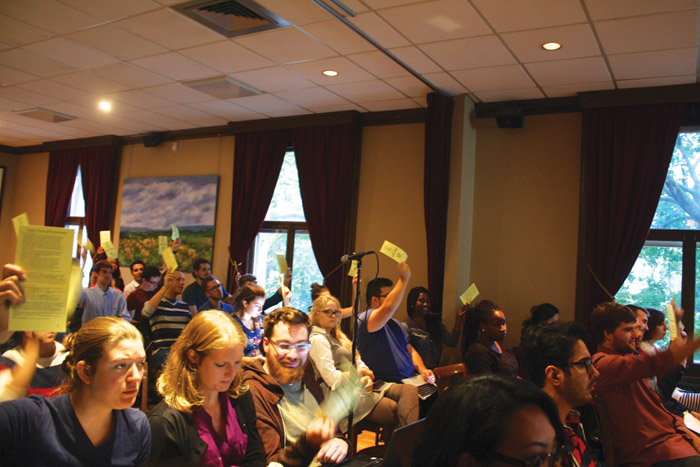Rassemblement des associations étudiantes (RAE)
On Sept. 5, the Quebec Superior Court found that the RAE, an organization that was formerly known as the Canadian Federation of Students Quebec (CFS-Q), was entitled to one-sixth of the membership fees collected by the Canadian Federation of Students National (CFS-N). The court also ruled that the RAE was entitled to membership fees that they collected between 2007 and 2010.
First-year Law student Jonathan Mooney, director of the RAE and former secretary general of PGSS, updated the Council on the case.
“The judge [ruled that] the money should go to the RAE, and that since PGSS is a member of RAE, that means that […] we will be getting some money back,” he said. “It’s also good for our colleagues at Concordia and Dawson, because they stand to gain some money from that judgement too.”
CFS vs. PGSS Case update
Ge Sa, PGSS’s internal affairs officer, spoke to the Council about a court case between himself and the CFS regarding dates for a referendum question proposing PGSS’s disaffiliation from CFS.
“The [Superior Court of Quebec’s] ruling is that the CFS will be mandated by court […] to give [PGSS] a referendum as soon as they can,” he said. “We will have a referendum hopefully this semester, and if this referendum passes, and we [agree to disaffiliate], we will no longer be a part of CFS.”
Sa highlighted his role as a graduate student at McGill, rather than as a member of the PGSS Executive committee, as the main plaintiff of the case.
“This sets a precedent for all student unions across Canada that have legal proceedings with the CFS: That individual students, such as myself, can ask the CFS to give us a referendum to disaffiliate from the CFS […] if students feel that their rights have been violated,” Sa said.
Charter of rights of students
PGSS External Affairs Officer Julien Ouellet spoke to Council about a proposed charter of rights of students at the provincial level that is being developed in conjunction with students at the University of Laval. The six major provisions of the charter would include general provisions regarding intellectual property, role and duties of research supervisors, role and duties of student researchers, role of the home institution, and role of the government.
“This goes pretty much hand in hand with the philosophy [of collaboration] that we’ve been nurturing at PGSS for the past couple of years,” Ouellet said. “We’ve tried to implement it [at McGill], but this is a good opportunity to collaborate with another student association and to have a broad legal framework that would support us in our campaign.”
The charter was critiqued at Council for being too broad in some of its provisions. Victor Frankel Vilches, a member of the Biology Graduate Student Association asked for a clearer definition of intellectual property.
“Oftentimes, what people say merits authorship on papers must be an intellectual contribution rather than simply just doing the [work],” Vilches said. “So [the charter] should mention some actual detail on [intellectual] contribution that merits authorship versus something that may be lab work or tech work that was assigned to [a student] as a per basis for pay or volunteership.”
In response to Council questions regarding possible discrepancies between the charter’s intellectual property policies and McGill’s own policies, Ouellet explained that the charter would supercede McGill’s policy.
“Since it’s a charter that would be ratified by the National Assembly [of Quebec], it would have more weight than the local university regulation,” Ouellet said, adding that the courts will not have the power to ultimately settle conflicts between the student and the supervisor.
The charter was amended to state that PGSS supported the spirit of the charter without necessarily signing on to all that the charter stipulated. The revised motion passed in council.
PGSS Bylaw reform
PGSS Secretary-General Juan Pinto spoke to Council about proposed bylaw changes. One aim of the changes is to consolidate a procedural structure so that decisions made by the Judicial Board will not contradict each other.
Pinto also proposed a restructuring of the judicial board.
“The secretary-general is the only sitting judge of the Judicial Board,” he said. “In any other system, this would not be allowed.”
Pinto continued to propose a system through which the Chief Justice would have the power to name two judges to a case on a case-by-case basis.
“The Chief Justice [would have] the power to name two judges, only to solve the one particular matter,” he said.
After a period of debate, the Council motioned to commit the issue to PGSS’s Policy and Structural Advisory Committee, which was passed.
The executive committee work plan, which outlines the responsibilities and projects of each executive member, was also approved by Council.








